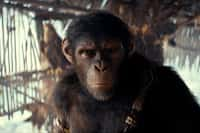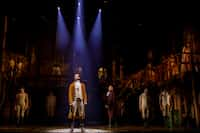Leonardo DiCaprio's acceptance speech at the Golden Globes late Sunday night lit up social media, particularly that part where he wanted to share his award with all indigenous communities worldwide.
DiCaprio won for Best Actor in a Drama for
The Revenant
, a film that used hundreds of American Indians as extras, many from First Nation communities across Alberta. DiCaprio's speech started as the standard shoutouts to the film's producers and actors. Then, while the wrapup music started, he rolled this out:
"And lastly, I want to share this award with all the First Nations people represented in this film and all the indigenous communities around the world. It is time that we recognize your history and that we protect your indigenous lands from corporate interests and people that are out there to exploit them. It is time that we heard your voice and protected this planet for future generations."
The last time American Indians had been brought up in a major film industry awards speech was 1973, when Marlon Brando turned down an Academy Award to protest the depiction of American Indians in film. In that instance, Brando's emissary, Sacheen Littlefeather, was booed by the audience.
But late Sunday and early Monday people took to social media regarding remarks by DiCaprio, who has been outspoken on environmental issues as well. Many posts were positive.
Leo de Caprio channeling @NaomiAKlein in his eloquent words @goldenglobes- honoring rights & history of indigenous people, first nations
— Katrina vandenHeuvel (@KatrinaNation) January 11, 2016
Bravo, Leo! Paying homage to Indigenous populations: "It is time that we heard your voice and protected this planet for future generations."
— Simone Amelia Jordan (@SimoneAJordan) January 11, 2016
Jacqueline Keeler, a Portland, Ore.-based writer and American Indian activist of Dineh and Yankton Dakota descent, welcomed DiCaprio's comments.
"It's really great that an actor, a Hollywood figure of Leonardo DiCaprio's standing, to basically come out and say that he cares about our issues," Keeler said. "I appreciated that. It felt great to be heard."
Sterlin Harjo, an American Indian filmmaker who has premiered his work at the Sundance Film Festival, also was happy to see DiCaprio's speech.
"That was pretty classy of him," Harjo said. "For indigenous people, a lot of time their voices aren't heard. And for him to bring that to people's attention, it can do nothing but good."
Harjo said he saw The Revenant and thought the depiction of Native people was well done.
"You can tell when a filmmaker does his work," he said. "The actors were playing characters. They fit in the narrative of what the film was telling us."Arthur Redcloud, a Colleyville resident who earned a starring credit in the movie as a Pawnee tribesman, credited director Alejandro González Iñárritu and DiCaprio for understanding the perspective of American Indians, First Nation and indigenous people.
"In the past, no Native American film has been done this great, and with this kind of spirituality," he said. "Everyone is Hollywood is saying we need more films like this.
"I couldn't have asked to work for a better director as well as a better actor, especially with the heart that Leo DiCaprio has for indigenous people."
In case you missed the Revenant pivot from "This was really hard" to "This is an issue movie," that was it.
— Mark Harris (@MarkHarrisNYC) January 11, 2016
But there was cynicism, too.
Slate.com's culture blog pointed out that the moment was "awkward and cynical", that it's "at odds with the movie DiCaprio and director Alejandro González Iñárritu produced. The Revenant is only the latest in a long history of major Hollywood studio films featuring indigenous characters that is told from the white male perspective. Their history is only "recognized" here in marginal juxtaposition to that of a white fur trader who is mauled by a bear, left to die, and then seeks revenge for the murder of his half-indigenous son (who barely says more than a few lines in the entire movie)."
In a post on Vice.com, American Indian comedian Ryan McMahon wrote: "For some, the anger and frustration at the representations of Indigenous people in the film don't allow all of us to see that The Revenant wasn't an Indigenous film. It was a film that happened to have a 'B story' that included Native people, but it was not an Indigenous story alone."






